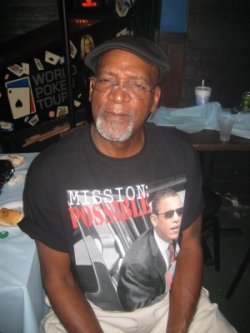A Dutch account of Obama’s victory in New Orleans
A Dutch friend of mine, Bente, who now lives and works in New Orleans (of all places!) and who didn’t sleep much last night, hung out at a few places, and everywhere she went, she watched the results with a full house of serious Obama fans.
Allow me to freely translate some of her thoughts:
It’s a historical day in America. More than we sober Dutch people realise. Today a black president was elected.
That Obama is not a real African-American – his father was a Kenyan student in Hawaii and his mother was a white American – barely makes a difference. The man has coloured skin so he’s black and here this means that you’re “one of us” (at least for African-Americans). For many conservative white people, it’s just as bad: the man is black and therefore evil.
That the colour of one’s skin is so important never ceases to amaze me, but here it’s a fact. Obama’s tint has united many and as of today every black kid can grow up with the idea that they too can become president.
I was never this happy about an election result in the Netherlands, but this really touched me. Not because I think the man is a saint or will bring about worldly changes. No, he’s going to have a tough time, and if he survives this, I’ll be impressed. However, the hope he gives people, especially African-Americans is something no one can take away from them. And who knows, maybe something will really change.
UPDATE: The photo credit is always of who takes the picture, not of who is in it!
(Photo: Bente)


This is an excellent post. Thank you.
Is the photo Bente, or taken by Bente? You refer to her so I am confused:
“Allow me to freely translate some of her thoughts.”
Also, Americans would consider Barack Obama a real African-American because his father is from Kenya in Africa, regardless of where he studied and where he lived afterward, and irrespective of the fact his mom was white and from Kansas.
In fact, African-American is somewhat of a misnomer. We use it to describe all black Americans, under the assumption their ancestors came from Africa. We use it as a synonym for “Black”. Only recently, have black Americans begun to distinguish between black and African-American.
Great news… Now if only people would turn off their radios when Rush Limbaugh comes on, Barbara Walters would slap the crap out of Elizabeth Hasselbeck, and Anne Coulter didn’t have a book on the best seller list.
I’m just sayin’.
The picture is taken by me. I’m female, younger and white. :)
(and I don’t have such a nice t-shirt)
@Neil:
Although “Afro-American” in the strict sense of the word relates to any person from black African descendant, it is generally used for the descendants of African slaves in the US.
I make the disctinction because to me “black” and “white” have more to do with culture and upbringing than with skin color.
The fact that Americans regard Obama as Afro-American therefor is typical to me, as culture-wise he is probably more white than black (at least from how he was raised).
And Americans can be very funny about their politically correct names. I had a friend who travelled to an African country and called all the people there Afro-americans. :)
She did the same to all the black people she saw in Holland.
I was told as a Canadian that African-American replaced Afro-Amercain because Afro was a haircut :) And that “black” was a bit of a no-no. Using “black” in France refers to soul music entertainers. The “N” word is the real no-no for everyone, although the Russian word for black person is the “N” word and has a purely neutral connotation.
Life is tough all over.
Haha, hadn’t heard the one about Afro/African.
The “N” word is commonly used amongst black men. They either use it to curse at eachother or almost fondly (nicely confusing, but I’m picking up on my African-American slang). But it is never to be used by a white person.
Bente’s experience with the n-word is the same as my experience. I hear young black men call each other nigger and it is not necessarily derogatory but it can be. It is more often a fond curse as it is an angry one. There is an idea that using the word takes it back from those who use it to hurt.
I don’t think most Americans would distinguish between a black man whose father was a free man (from Kenya) and a black man whose grandfather was a slave in the US. We don’t have words for that.
Similarly, “black” culture is not a specific cultural inheritance, it is decidedly non-specific; it might include description of a cultural inheritance from Alabama, New Orleans, the Bahamas or Sierra Leone. Although, if a black man spoke with a Jamaican accent he would be more than black, he would be Jamaican too. To me, language is telling and I raise it to explore it and to learn from others.
I blog with a pseudonym. I have dutch heritage and a dutch name. I feel connected to the Dutch although my visits have been temporary and I don’t speak the language. I am decidedly more American than Dutch nonetheless I have an affection for the great people of this country. In English my name would be John Eastern-village.
I hope Bente continues to contribute here at 24 Oranges. Seeing your own country through the eyes of a person from another country provides a fresh look, a new examination, and it is thought-provoking. I hope my contributions here in the comments are too. Thanks Orangemaster.